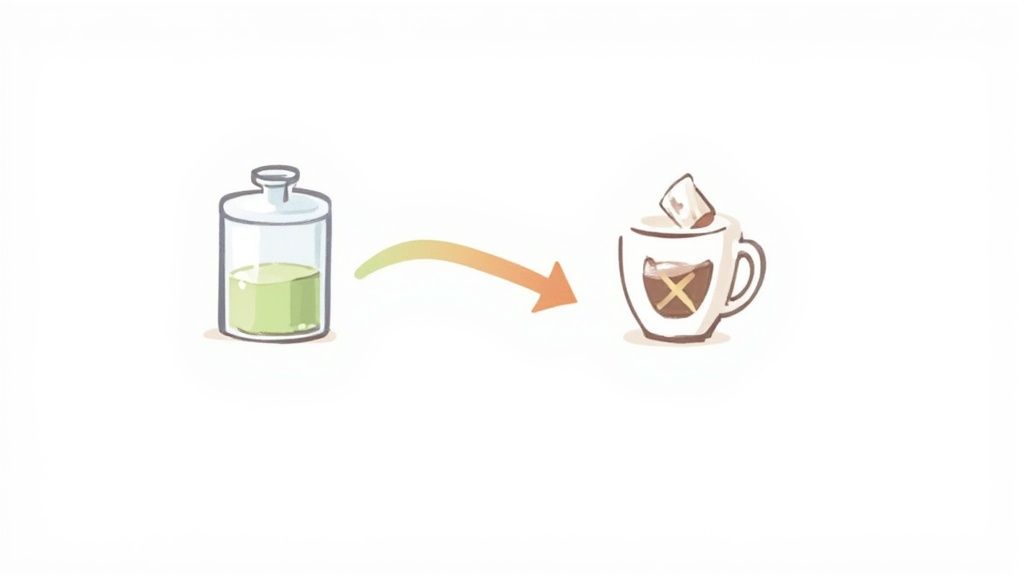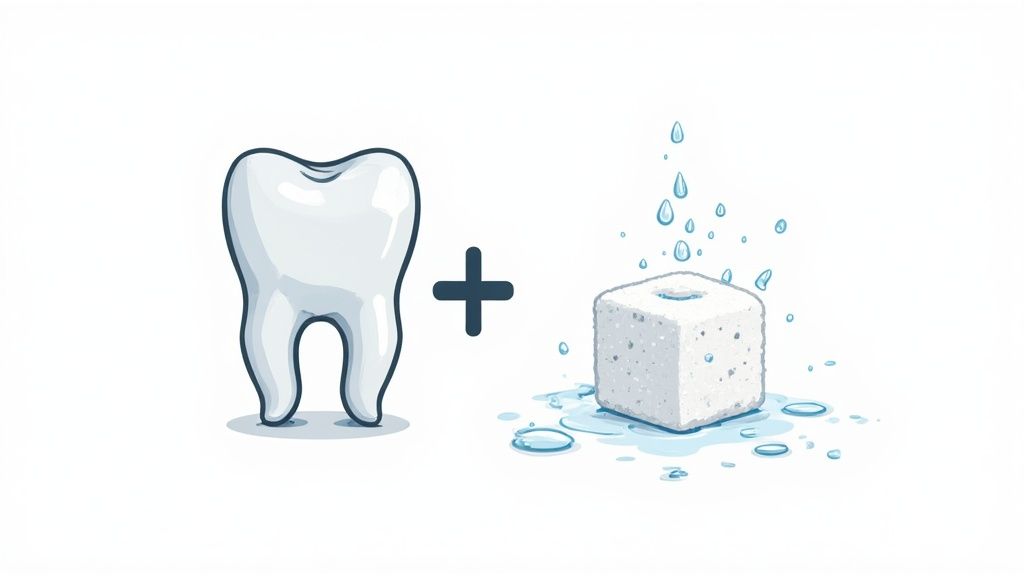8 Incredible Benefits of Giving Up Sugar in 2025

In our daily lives, sugar is everywhere. It’s in our morning coffee, our "healthy" breakfast cereals, and even our savory sauces. We often reach for it as a quick energy boost or a comforting treat, but this reliance comes with hidden costs that affect our physical and mental well-being. The cycle of sugar highs followed by energy crashes, brain fog, and persistent cravings can feel impossible to break. Many of us know we should cut back, but the "why" and "how" can seem overwhelming.
This article is designed to cut through the noise and provide a clear, actionable guide to understanding the profound benefits of giving up sugar. We’re not just going to tell you it's good for you; we’re going to show you exactly how it transforms your health. From achieving sustainable weight loss and gaining consistent all-day energy to enhancing your mental clarity and even improving your skin, the positive changes are significant and far-reaching.
Below, we’ll explore eight specific, science-backed benefits you can expect when you decide to reduce your sugar intake. Each point includes practical steps and real-world examples to help you start your journey today. Consider this your roadmap to a healthier, more vibrant you.
1. Weight Loss and Improved Body Composition
One of the most immediate and motivating benefits of giving up sugar is its profound impact on weight loss and body composition. Added sugars, particularly in liquid form like sodas and sweetened teas, are a major source of "empty calories." These calories provide energy but offer virtually no nutritional value, like vitamins, minerals, or fiber.
When you consume sugary foods, your body gets a quick spike in blood glucose. Your pancreas releases insulin to manage this spike, shuttling the glucose into your cells for energy. However, any excess glucose that isn't immediately used is converted and stored as fat, often around the abdomen. This process not only contributes to weight gain but specifically to an increase in visceral fat, the dangerous type that surrounds your organs.
How It Works: The Calorie and Hormone Connection
Reducing sugar intake directly tackles weight gain from two angles:
- Calorie Reduction: By simply swapping a daily 20-ounce soda (around 240 calories) for water, you could cut over 87,000 calories in a year. This deficit alone can lead to significant weight loss without other major dietary changes.
- Hormonal Balance: Lowering sugar intake helps stabilize insulin levels. When insulin is constantly high, it promotes fat storage and blocks fat burning. Stable insulin signals your body to start using its stored fat for energy, improving your overall body composition by reducing fat mass while preserving muscle.
Key Insight: Successful weight loss from quitting sugar isn't just about cutting calories; it's about rebalancing the hormones that control fat storage, making your body a more efficient fat-burning machine.
This shift helps you lose pounds and fundamentally changes your body's shape, reducing harmful belly fat and supporting a leaner physique. This is a primary reason why managing sugar is a cornerstone of sustainable weight management.
2. Stabilized Energy Levels and Reduced Fatigue
One of the most noticeable benefits of giving up sugar is escaping the exhausting energy roller coaster. High-sugar snacks and meals cause a rapid spike in your blood glucose, giving you a temporary, jittery burst of energy. This is inevitably followed by a sharp crash as your body overcorrects with a surge of insulin, leaving you feeling sluggish, irritable, and often craving more sugar to get another boost.

Breaking this cycle allows your body to tap into more stable, long-lasting energy sources. By avoiding these dramatic blood sugar fluctuations, you can maintain consistent energy throughout the day, eliminating the dreaded mid-afternoon slump. This shift is powerful; some corporate wellness programs have reported significant improvements in afternoon productivity after implementing sugar-reduction initiatives.
How It Works: The Blood Sugar Balance Act
Eliminating added sugar helps you achieve metabolic flexibility, where your body can efficiently switch between burning carbohydrates and fats for fuel. This creates a much more reliable energy supply.
- Steady Fuel Supply: Instead of relying on quick sugar hits, your body uses energy from complex carbohydrates, protein, and healthy fats. These nutrients are digested more slowly, providing a gradual and sustained release of glucose into your bloodstream.
- Preventing the Crash: Without the sugar spike, there's no corresponding insulin-driven crash. Your energy levels remain even, allowing you to stay focused and productive for longer periods without needing a caffeine or sugar fix. For more ideas, learn how to increase energy levels naturally.
Key Insight: Consistent energy isn't about constantly adding fuel; it's about using better-quality fuel that burns slowly and steadily. Giving up sugar swaps the volatile highs and lows for a dependable, all-day energy baseline.
This change not only helps you feel more awake but also reduces mental fog and improves concentration, making it a cornerstone benefit of a low-sugar lifestyle.
3. Enhanced Mental Clarity and Cognitive Function
Beyond physical health, one of the most transformative benefits of giving up sugar is the profound improvement in mental clarity and cognitive performance. A diet high in added sugars creates a volatile environment for your brain, leading to inflammation and erratic blood sugar swings that manifest as brain fog, poor memory, and difficulty concentrating.
When you remove excess sugar, you provide your brain with the stable energy it needs to operate efficiently. Instead of enduring the sharp mental peaks and debilitating crashes that follow a sugary snack, your brain can maintain steady neurotransmitter production, supporting sustained focus and sharper cognitive function throughout the day.

How It Works: The Brain Fog and Neurotransmitter Connection
Reducing sugar intake directly enhances brain function through two key mechanisms:
- Stabilizing Energy Supply: The brain consumes a massive amount of energy. When that energy comes from a constant supply of glucose from complex carbs and healthy fats, it functions optimally. High-sugar diets cause rapid spikes and crashes, disrupting this supply and leading directly to the feeling of mental fatigue or "brain fog."
- Reducing Inflammation: Chronic high sugar consumption promotes inflammation throughout the body, including the brain. Neuroinflammation is linked to impaired cognitive function and a higher risk of long-term neurodegenerative diseases. Cutting sugar helps calm this inflammation, allowing for clearer thinking and better memory recall.
Key Insight: A clear mind isn't just about avoiding distractions; it's about providing your brain with stable, high-quality fuel. Giving up sugar removes the primary source of neural inflammation and energy instability, effectively lifting the fog.
This shift allows for sharper focus and improved memory, a benefit highlighted by studies showing improved academic performance in students and enhanced productivity in professional environments. It is a cornerstone of brain-healthy lifestyles promoted by experts like Dr. David Perlmutter.
4. Better Skin Health and Anti-Aging Effects
One of the most visible benefits of giving up sugar manifests on your skin, often leading to a clearer, more youthful complexion. Excess sugar in your diet triggers a damaging process called glycation, where sugar molecules attach to proteins in your body, like collagen and elastin. These proteins are responsible for keeping your skin firm, supple, and resilient.

When glycation occurs, it forms harmful molecules called Advanced Glycation End-products (AGEs). These AGEs make your collagen and elastin fibers stiff, brittle, and weak. This internal damage shows up externally as fine lines, wrinkles, sagging, and a dull, lackluster skin tone. Reducing sugar intake effectively slows down this premature aging process from the inside out.
How It Works: The Glycation and Inflammation Connection
Eliminating added sugar improves your skin's health and appearance through two primary mechanisms:
- Halting Glycation: By cutting off the supply of excess sugar, you starve the glycation process. This allows your body to preserve its existing collagen and elastin, helping your skin maintain its structural integrity and youthful bounce. Clinical studies have shown significant improvements in skin clarity and texture in as little as 12 weeks on a low-sugar diet.
- Reducing Inflammation: Sugar is a highly inflammatory substance. Chronic inflammation can exacerbate skin conditions like acne, rosacea, and eczema. Removing sugar calms this systemic inflammation, leading to a reduction in redness, breakouts, and overall irritation, resulting in a more even and glowing complexion.
Key Insight: Beautiful skin isn't just about what you put on it; it's profoundly affected by what you put in your body. Quitting sugar is like an internal anti-aging treatment that protects your collagen and reduces the inflammation that ages you.
This powerful change helps your skin repair itself more effectively, restoring its natural radiance and resilience. Dermatologists like Dr. Whitney Bowe often highlight sugar reduction as a foundational step for achieving long-term skin health.
5. Improved Heart Health and Reduced Disease Risk
Protecting your heart is one of the most critical long-term benefits of giving up sugar. While often associated with saturated fats, research increasingly points to added sugar as a primary driver of heart disease. High sugar intake directly contributes to several cardiovascular risk factors, including elevated triglycerides, high blood pressure, and chronic inflammation.
When you consume excess sugar, your liver works overtime to process it, converting much of it into triglycerides, a type of fat that circulates in your blood. High levels of triglycerides can harden your arteries, increasing your risk of stroke and heart attack. Furthermore, a high-sugar diet promotes systemic inflammation, which can damage blood vessel linings and contribute to atherosclerosis.
How It Works: The Cardiovascular Connection
Eliminating added sugar improves your heart health through several direct and measurable pathways:
- Lowering Triglycerides and LDL Cholesterol: Reducing sugar intake gives your liver a break, allowing it to process fats more efficiently. This leads to a significant drop in harmful triglycerides and "bad" LDL cholesterol levels, two major markers for cardiovascular disease.
- Reducing Blood Pressure: Sugar can interfere with the body's ability to process salt and can cause blood vessels to constrict, both of which contribute to hypertension. Studies by the American Heart Association show that cutting sugar can lead to noticeable improvements in blood pressure in as little as a few weeks.
- Decreasing Inflammation: Sugar is a highly inflammatory substance. By removing it, you reduce the chronic, low-grade inflammation that damages arteries and is a root cause of many diseases. You can learn more about how certain foods contribute to this process and what foods cause inflammation.
Key Insight: Giving up sugar is a powerful, proactive step to protect your cardiovascular system. It directly addresses the biochemical processes that lead to heart disease, rather than just managing the symptoms.
This dietary change is a fundamental strategy for preventing metabolic syndrome, type 2 diabetes, and heart disease, making it one of the most impactful health decisions you can make.
6. Enhanced Mood and Emotional Stability
Beyond the physical benefits, giving up sugar has a remarkable effect on your emotional and mental well-being. The notorious "sugar high" followed by a "crash" is more than just an energy slump; it's a volatile cycle that directly impacts your mood. High sugar intake is strongly linked to inflammation, nutrient deficiencies, and disruptions in the brain's delicate chemistry, contributing to higher rates of anxiety and depression.
When you consume a sugary treat, your blood glucose spikes, providing a temporary mood boost. However, the subsequent rapid drop triggers the release of stress hormones like adrenaline and cortisol. This hormonal roller coaster can leave you feeling irritable, anxious, and emotionally unstable. Breaking this cycle is a key benefit of giving up sugar, leading to a more balanced and predictable mood.
How It Works: The Brain Chemistry Connection
Stabilizing your mood by quitting sugar works through two primary neurological pathways:
- Neurotransmitter Regulation: Sugar consumption can disrupt the production and function of key neurotransmitters like dopamine (pleasure) and serotonin (mood stabilization). Reducing sugar helps restore this balance, allowing your brain to regulate mood more effectively without artificial stimulation.
- Reduced Inflammation: A high-sugar diet promotes chronic inflammation, which research has directly linked to a higher risk of depression. By removing sugar, you reduce this inflammatory response, creating a healthier internal environment that supports better mental health. If you're interested in delving deeper into strategies for personal growth and emotional resilience, consider these top psychology books to support your well-being.
Key Insight: Emotional stability isn't about avoiding life's ups and downs; it's about building a resilient brain. Quitting sugar removes a major source of chemical volatility, allowing your natural mood-regulating systems to function as they should.
This shift helps you feel more in control, less reactive to daily stressors, and better equipped to handle emotional challenges. For more tips, you can explore which mood-boosting foods to include in your diet.
7. Stronger Immune System Function
One of the most powerful yet often overlooked benefits of giving up sugar is the direct boost it provides to your immune system. High sugar consumption acts as a suppressant, hindering your body's natural ability to fight off illness. It can impair the function of white blood cells, your primary defense against pathogens, and fuels chronic inflammation, which keeps your immune system in a constant state of low-grade stress.
When you eat sugary foods, you're also feeding the harmful bacteria and yeast in your gut. This disrupts the delicate balance of your gut microbiome, a complex ecosystem that plays a crucial role in regulating up to 70% of your immune response. A compromised gut is less effective at defending against viruses and bacteria, making you more susceptible to common colds, flu, and other infections.
How It Works: The Cellular and Gut Connection
Reducing your sugar intake strengthens your immune defenses from two key angles:
- Enhanced White Blood Cell Activity: Studies have shown that consuming a large dose of sugar can temporarily reduce the ability of white blood cells to engulf and destroy bacteria. By removing this dietary stressor, your immune cells can function at their peak efficiency, responding more quickly and effectively to threats.
- Gut Microbiome Rebalancing: Cutting out sugar starves the "bad" gut bacteria that thrive on it, allowing beneficial bacteria to flourish. A healthier gut lining creates a stronger barrier against pathogens and supports the production of immune cells, fortifying your body’s defenses from the inside out.
Key Insight: A strong immune system starts in the gut. Giving up sugar is one of the most effective ways to rebalance your gut microbiome, creating an environment where your body's natural defenses can thrive and protect you more effectively.
This internal shift not only reduces how often you get sick but can also lessen the severity and duration of illnesses, making it a cornerstone of long-term health and resilience.
8. Improved Dental Health and Oral Hygiene
One of the most direct and scientifically proven benefits of giving up sugar is a dramatic improvement in your dental health. Sugar is the primary food source for harmful bacteria that live in your mouth, such as Streptococcus mutans. These bacteria consume sugar and produce acid as a byproduct, creating a hostile environment for your teeth.
This acid attacks your tooth enamel, the hard, protective outer layer. Over time, this demineralization process weakens the enamel, leading to the formation of cavities, tooth decay, and gum inflammation (gingivitis). By cutting out added sugar, you effectively starve these acid-producing bacteria, halting this destructive cycle in its tracks.
How It Works: The Mouth's pH Connection
Reducing your sugar intake improves oral hygiene by addressing the root cause of decay from two key angles:
- Starving Harmful Bacteria: When you eliminate their primary fuel source, the population of cavity-causing bacteria in your mouth decreases. This directly reduces the amount of harmful acid produced after you eat, protecting your enamel from constant attack.
- Restoring pH Balance: A sugar-rich diet keeps your mouth in an acidic state, which is ideal for tooth decay. Removing sugar allows your saliva, the body’s natural defense mechanism, to neutralize acids more effectively and restore a healthy, non-acidic pH balance, which promotes remineralization and strengthens teeth.
Key Insight: Protecting your teeth isn't just about brushing away sugar after you eat; it's about creating an oral environment where decay-causing bacteria cannot thrive in the first place. Giving up sugar fundamentally changes that environment for the better.
This shift not only prevents new cavities but also helps reduce gum inflammation and improves overall oral hygiene, leading to fewer dental bills and a healthier smile. It is a foundational step for long-term dental wellness, supporting the efforts of regular brushing and flossing.
Benefits Comparison of Giving Up Sugar
| Benefit | Implementation Complexity 🔄 | Resource Requirements ⚡ | Expected Outcomes 📊 | Ideal Use Cases 💡 | Key Advantages ⭐ |
|---|---|---|---|---|---|
| Weight Loss and Improved Body Composition | Moderate – requires label reading, planning | Moderate – need for meal prep and substitutes | Sustainable fat loss, lower visceral fat | Individuals seeking fat reduction | Reduced cravings, improved metabolism |
| Stabilized Energy Levels and Reduced Fatigue | Moderate – adjustment period 1-2 weeks | Low to Moderate – balanced meals, hydration | Consistent energy, less fatigue | People with energy crashes, caffeine reliance | No more energy crashes, better sleep |
| Enhanced Mental Clarity and Cognitive Function | Moderate – withdrawal may cause sluggishness | Moderate – brain-supporting foods, mental activity | Sharper focus, improved memory | Students, professionals needing focus | Reduced brain fog, better cognition |
| Better Skin Health and Anti-Aging Effects | Moderate – results take 4-8 weeks | Moderate – hydration, antioxidants, skincare | Clearer skin, fewer wrinkles | Those targeting skin aging and acne | Radiant complexion, less inflammation |
| Improved Heart Health and Reduced Disease Risk | Higher – comprehensive lifestyle changes | Moderate to High – diet, exercise, monitoring | Lower blood pressure, reduced heart risk | At risk for heart disease or diabetes | Significant cardiovascular risk reduction |
| Enhanced Mood and Emotional Stability | Moderate – possible initial mood swings | Low to Moderate – diet, stress management | Stable mood, reduced anxiety | Individuals with mood instability | Better stress management, emotional resilience |
| Stronger Immune System Function | Moderate – temporary detox symptoms | Moderate – probiotics, vitamin C, sleep | Fewer infections, faster recovery | Those prone to infections or allergies | Enhanced immunity, reduced inflammation |
| Improved Dental Health and Oral Hygiene | Low to Moderate – maintaining hygiene routines | Low – good oral care, fluoride toothpaste | Fewer cavities, healthier gums | General population aiming to prevent dental issues | Reduced dental problems, fresher breath |
Your Next Steps to a Sugar-Free Future
We've explored the incredible ripple effect that reducing sugar can have on your life. From achieving sustainable weight loss and unlocking consistent, crash-free energy to gaining sharper mental clarity and a more stable mood, the benefits of giving up sugar are profound and far-reaching. It’s not just about what you lose, like excess weight or brain fog, but about what you gain: vitality, resilience, and a deeper connection to your body's true needs.
You now understand how cutting back on sugar can transform your skin, strengthen your heart, bolster your immune system, and even protect your smile. Each benefit we discussed is a powerful motivator, a piece of a larger puzzle that forms a picture of a healthier, more vibrant you. The journey isn't about deprivation; it's about empowerment and making conscious choices that serve you in the long run.
From Knowledge to Action: Your Simple Starting Plan
Feeling inspired is the first step, but turning that inspiration into lasting change requires a clear, manageable plan. Instead of trying to overhaul everything at once, focus on small, consistent actions that build momentum.
Here are three actionable steps you can take today to begin your journey:
- Start with One Meal: Don't worry about perfecting your entire day's menu. Pick one meal, like breakfast, and commit to making it free of added sugars. Swap your sugary cereal for oatmeal with berries and nuts, or trade your sweetened yogurt for a plain Greek yogurt. Mastering one meal builds confidence.
- Become a Label Detective: For the next week, make a habit of reading the nutrition labels on everything you buy. Pay close attention to the "Added Sugars" line. You’ll be surprised where sugar hides, from pasta sauces and salad dressings to bread and crackers. This awareness is a powerful tool for making informed choices.
- Upgrade Your Snacks: Snacking is often where hidden sugars derail our best intentions. Instead of reaching for a cookie or candy bar when the 3 p.m. slump hits, have a healthier alternative ready. As you commit to a sugar-free future, discovering truly wholesome and delicious alternatives, such as delicious snack bars without added sugar, can make all the difference in staying on track without feeling deprived.
Embracing a Sweeter Life, Not a Sweeter Diet
This journey is a marathon, not a sprint. There will be challenges, and perfection isn't the goal. The true victory lies in progress and in how you feel day-to-day. Remember the significant benefits of giving up sugar: every time you choose a whole food over a processed one, you are casting a vote for better energy, a clearer mind, and a healthier body.
You have the knowledge and the tools to redefine your relationship with sugar. Start small, be patient with yourself, and celebrate every positive change you make. Your future self will thank you for it.